A bad oil filter is a component in a vehicle that fails to effectively remove contaminants from the engine oil. When compromised it can allow dirt and debris to circulate leading to engine damage and reduced performance.
Ever wondered can a bad oil filter cause low oil pressure? The answer might surprise you. A worn-out oil filter can restrict oil flow leading to decreased pressure. Don’t underestimate the impact of a neglected filter it could be the culprit behind your low oil pressure issues. So next time you change your oil remember the importance of a healthy oil filter.
A malfunctioning oil filter can cause low oil pressure by restricting oil flow. This reduction in pressure may lead to engine damage over time. Regularly replacing the oil filter is crucial to maintain proper oil circulation and protect the engine.
The functionality of Oil Filters
Oil filters are essential components in internal combustion engines. Their primary function is to remove impurities and contaminants from the engine oil, preventing them from causing damage to critical components. As the engine operates debris like dirt and metal particles can accumulate, and the oil filter plays a crucial role in ensuring the oil remains clean.
The Oil Filter Relocation Kit is an innovative solution that can enhance the accessibility and ease of maintenance for oil filters providing added convenience for users. This not only extends the lifespan of the engine but also contributes to improved fuel efficiency and overall performance.
A Bad Oil Filter poses a significant threat to engine health. When a filter malfunctions or becomes clogged contaminants can circulate freely leading to accelerated wear on engine components. This can result in reduced performance increased fuel consumption and over time severe damage to the engine.
Regular maintenance including timely replacement of oil filters, is crucial to prevent these issues and ensure the engine’s proper functioning. Ignoring signs of a bad oil filter can lead to costly repairs and in extreme cases, engine failure.
Filtering contaminants from engine oil
Filtering contaminants from engine oil is crucial for maintaining optimal engine performance. Specialized oil filters trap particles like dirt and metal fragments, preventing them from circulating through the engine and causing damage. Regular oil changes with quality filters help extend the engine’s lifespan and ensure smooth operation.
Ensuring clean oil circulation for engine lubrication
Maintaining clean oil circulation is essential for effective engine lubrication. Filters play a vital role in trapping impurities such as dirt and debris preventing them from compromising the oil’s quality. This process ensures smoother engine operation reduces wear and tear and contributes to overall engine longevity.
Impact of a Bad Oil Filter on Oil Pressure
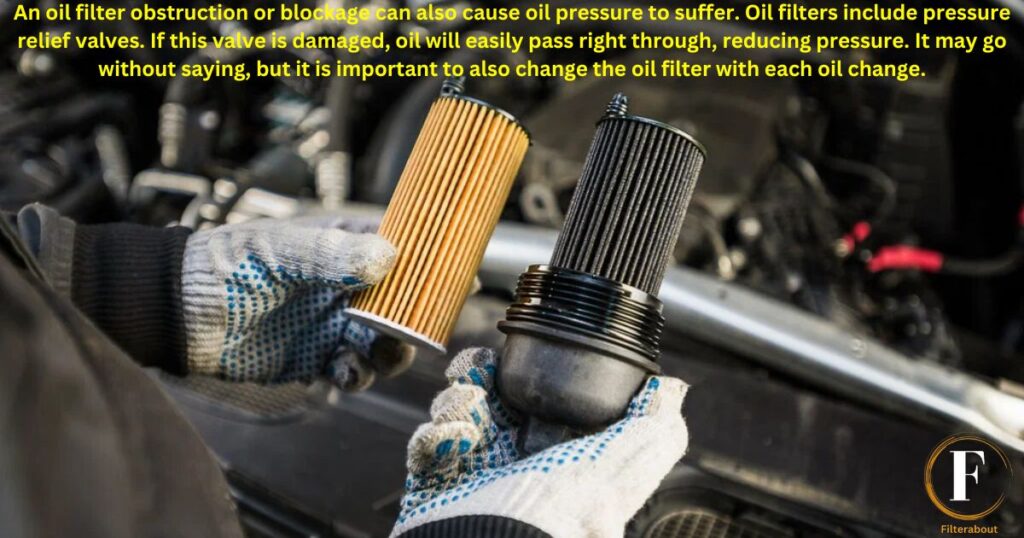
| Step | Action | Description |
| 1 | Lack of Filtration | A bad oil filter fails to effectively remove contaminants from the oil, allowing debris to circulate in the engine. |
| 2 | Increased Friction | Unfiltered oil can lead to increased friction between engine components, reducing efficiency and causing premature wear. |
| 3 | Elevated Operating Temperatures | Inadequate filtration hinders heat dissipation, causing the engine to operate at higher temperatures and potentially leading to overheating. |
| 4 | Reduced Lubrication | Impaired oil flow results in inadequate lubrication, jeopardizing the smooth functioning of engine parts and increasing the risk of damage. |
| 5 | Fluctuating Oil Pressure | The compromised filter allows variations in oil pressure, leading to inconsistent performance and potential engine malfunctions. |
| 6 | Long-term Engine Damage | Persistent use of a bad oil filter can contribute to irreversible engine damage, reducing overall longevity and efficiency. |
Reduced filtration efficiency leads to oil contamination
Decreased filtration efficiency in machinery can result in heightened vulnerability to oil contamination. Efficient filtration plays a crucial role in maintaining equipment integrity and preventing the adverse Effects of impurities in oil systems.
Potential blockage or clogging of oil passages
Reduced filtration efficiency poses the risk of potential blockage or clogging in oil passages jeopardizing the smooth operation of machinery and necessitating timely maintenance to ensure optimal performance.
Symptoms of Low Oil Pressure
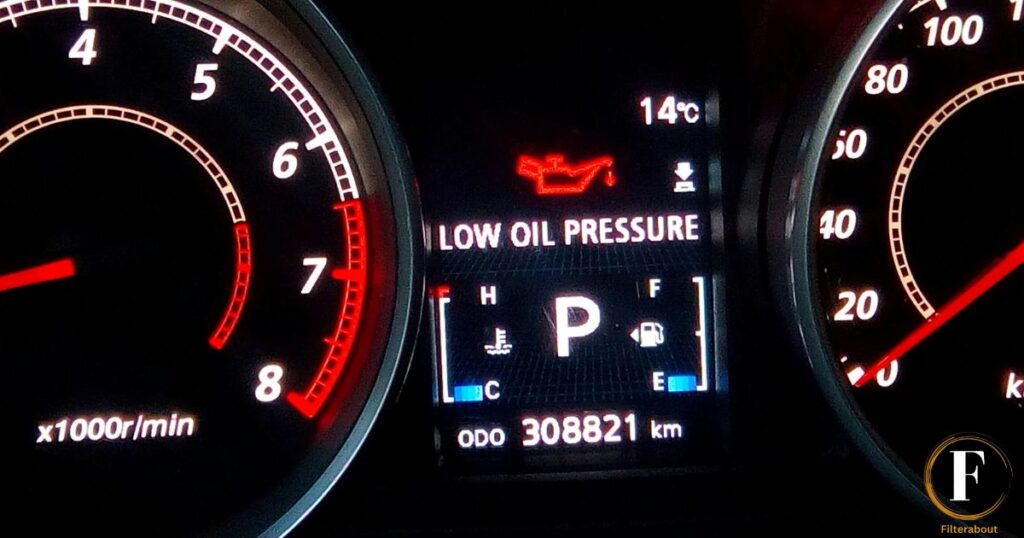
Low oil pressure can be a critical issue in a vehicle, signaling potential engine problems. One common symptom of low oil pressure is a persistent warning light on the dashboard. If this light illuminates it indicates that the oil pressure has fallen below the recommended level which may lead to inadequate lubrication of the engine components.
Another noticeable sign is engine noise, such as knocking or ticking sounds as low oil pressure can result in increased friction and wear on vital engine parts. If the oil pressure gauge consistently shows lower-than-normal readings it suggests a potential problem that requires immediate attention.
One possible cause of low oil pressure is a bad oil filter which can become clogged or faulty impeding the smooth flow of oil through the engine.
A bad oil filter can contribute to low oil pressure by obstructing the passage of clean oil to the engine. Over time oil filters can accumulate debris and contaminants, restricting the flow and causing the oil pump to work harder than necessary. This increased strain on the oil pump can lead to a drop in oil pressure, affecting the overall performance and longevity of the engine.
Regular maintenance including timely oil and oil filter changes is crucial to prevent the negative consequences associated with low oil pressure with special attention to ensuring the oil filter is in good condition to facilitate proper oil circulation within the engine.
Warning indicators on the dashboard
The warning indicators on your dashboard serve as important communication tools for your vehicle. These lights such as the check engine or low fuel indicator alert you to potential issues or necessary actions. Paying attention to these warnings ensures a smooth and safe driving experience.
Engine performance issues and unusual noises
If you notice engine performance issues such as a decrease in power or rough idling it could indicate underlying problems. Unusual noises like knocking or rattling might signal potential issues with the engine or other components. Prompt attention to these signs can help prevent further damage and ensure optimal vehicle performance.
Consequences of Prolonged Low Oil Pressure
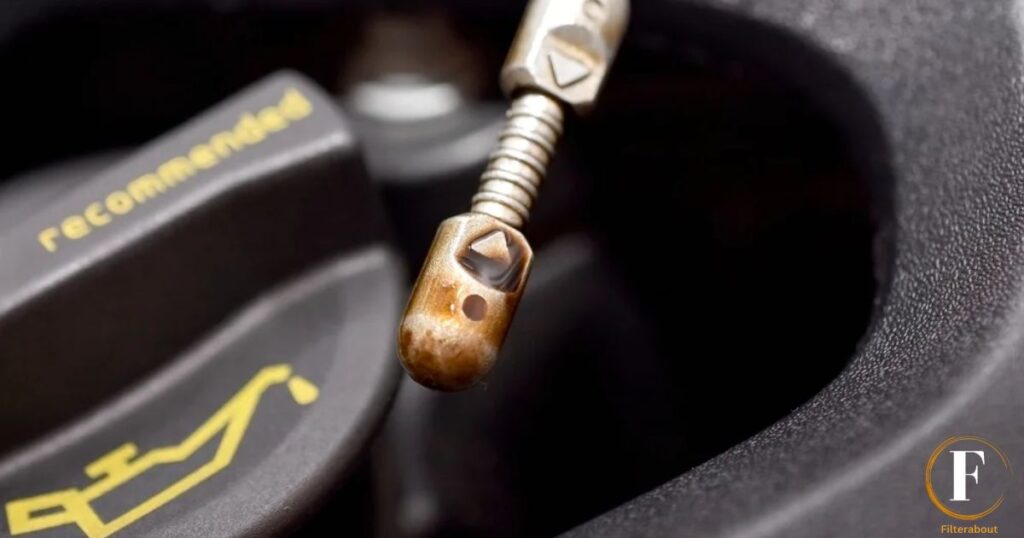
- Immediate Inspection: Upon noticing low oil pressure indicators, the first step is to immediately inspect the engine. Ignoring the issue can lead to irreversible damage.
- Check Oil Levels: Verify the oil level to ensure it is within the recommended range. Low oil levels can contribute to low oil pressure indicating a potential leak or consumption issue.
- Inspect for Leaks: Examine the engine for any signs of oil leaks including under the vehicle and around the oil pan gasket, or oil filter. Addressing leaks promptly is crucial to maintaining proper oil pressure.
- Oil Filter and Pump Evaluation: Assess the condition of the oil filter and oil pump. A clogged filter or a malfunctioning pump can impede oil flow causing a pressure drop.
- Engine Component Examination: Conduct a thorough inspection of critical engine components such as bearings and connecting rods. Prolonged low oil pressure can result in excessive wear so identifying damaged parts early is essential.
- Addressing Issues: Based on the findings take corrective actions such as replacing the oil filter fixing leaks replenishing oil levels or repairing/replacing damaged components. Regular maintenance and monitoring thereafter will help prevent the recurrence of low oil pressure and ensure the engine’s optimal performance.
Increased engine wear and tear
Increased engine wear and tear can result from various factors such as inadequate lubrication or contamination of the engine oil.
One significant contributor to this issue is a Bad Oil Filter which if not promptly replaced allows impurities to circulate in the engine oil accelerating wear on crucial components. Regular maintenance including timely oil filter replacement is essential to preserve engine longevity and performance.
Potential engine damage and failure
Potential engine damage and failure may occur due to increased wear and tear, often exacerbated by neglecting crucial maintenance tasks like changing the oil filter.
A Bad Oil Filter can lead to the accumulation of harmful contaminants in the engine oil, causing accelerated deterioration of vital engine parts. Routine replacement of the oil filter is vital in preventing potential costly repairs and ensuring the longevity of your engine.
Importance of Regular Oil Filter Maintenance
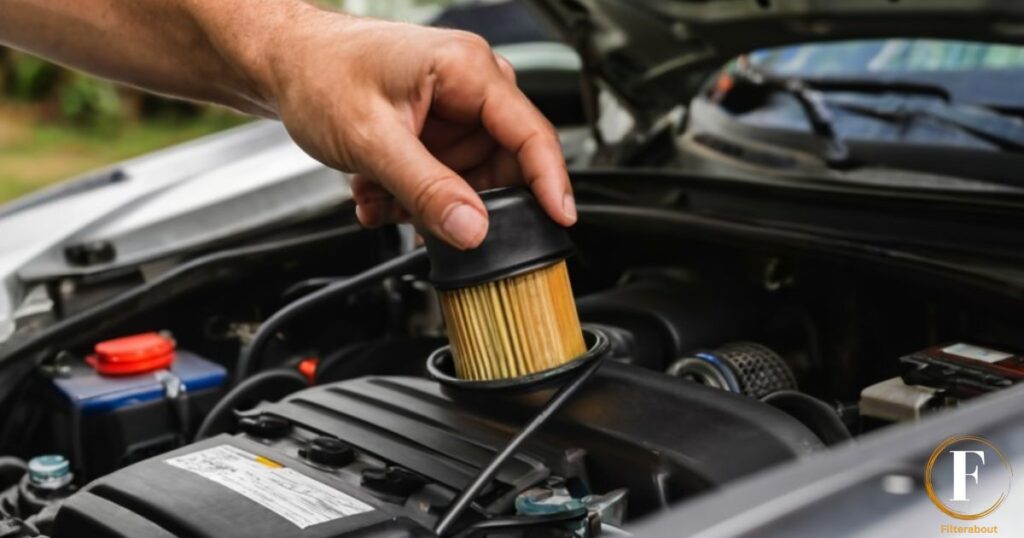
Regular oil filter maintenance is crucial for the overall health and longevity of a vehicle’s engine. The primary function of an oil filter is to trap contaminants, such as dirt debris and metal particles preventing them from circulating through the engine and causing damage.
Over time however, the filter becomes saturated with these impurities leading to reduced filtration efficiency. Failure to replace or clean the oil filter at recommended intervals can result in restricted oil flow leading to increased friction and wear on engine components.
This can lead to diminished engine performance, decreased fuel efficiency, and even long-term damage. Therefore staying vigilant about regular oil filter maintenance is essential to ensure a smooth-running engine and extend the life of the vehicle.
Neglecting oil filter maintenance can have severe consequences for a vehicle potentially resulting in a Bad Oil Filter scenario. A clogged or deteriorated oil filter fails to effectively filter out contaminants, allowing them to circulate freely through the engine.
This unrestricted flow of impurities can lead to increased friction overheating and accelerated wear on vital engine parts. In the worst-case scenario, a bad oil filter can cause a complete engine failure leaving the vehicle inoperable.
To avoid such costly and inconvenient issues it’s imperative to adhere to the manufacturer’s recommendations for oil filter replacement intervals and conduct regular inspections. By doing so car owners can ensure optimal engine performance and avoid the detrimental effects associated with a bad oil filter.
Scheduled filter replacement and inspection
Regular scheduled filter replacement and inspection are crucial for maintaining the optimal performance of your vehicle.
These routine checks ensure that essential filters such as the oil filter, are in good condition preventing issues like Bad Oil Filter that could lead to engine damage. By adhering to a maintenance schedule you can enhance the longevity and efficiency of your vehicle.
Ensuring optimal engine performance and longevity
Scheduled filter replacement and inspection are essential for ensuring optimal engine performance and longevity.
By adhering to a routine maintenance schedule, you can prevent issues such as Bad Oil Filter safeguarding your engine from potential damage and ensuring a smooth and efficient operation over time. Regular checks contribute to the overall health and durability of your vehicle’s engine.
Frequently Asked Questions
Why is my oil pressure low if I have enough oil?
Possible causes for low oil pressure despite having sufficient oil include a faulty oil pump worn bearings oil leaks or engine issues.
What is most likely to cause low oil pressure?
A failing oil pump worn engine bearings oil leaks or a clogged oil filter are common culprits for low oil pressure.
How do you fix lost oil pressure?
To fix lost oil pressure address the root cause. Check for oil leaks replace a faulty oil pump fix worn bearings and maintain proper oil levels.
Conclusion
The health of an oil filter plays a crucial role in maintaining optimal engine performance. A deteriorating or clogged oil filter can impede the smooth flow of oil through the engine, leading to a drop in oil pressure. This decline in pressure jeopardizes the engine’s ability to function. Potentially causing severe damage over time. Can a Bad Oil Filter Cause Low Oil Pressure? Regular maintenance and timely replacement of oil filters are imperative to prevent such issues and ensure the longevity of the engine.
Neglecting the significance of a quality oil filter may result in long-term consequences, ranging from increased engine wear to a compromised overall driving experience. Therefore, acknowledging and addressing the impact of a bad oil filter on oil pressure is paramount for the well-being and performance of any vehicle.

Alexander Quinn is the author behind Filterabout.com. Known for expertise in diverse topics, Quinn’s content on the website reflects a versatile knowledge base catering to various interests.
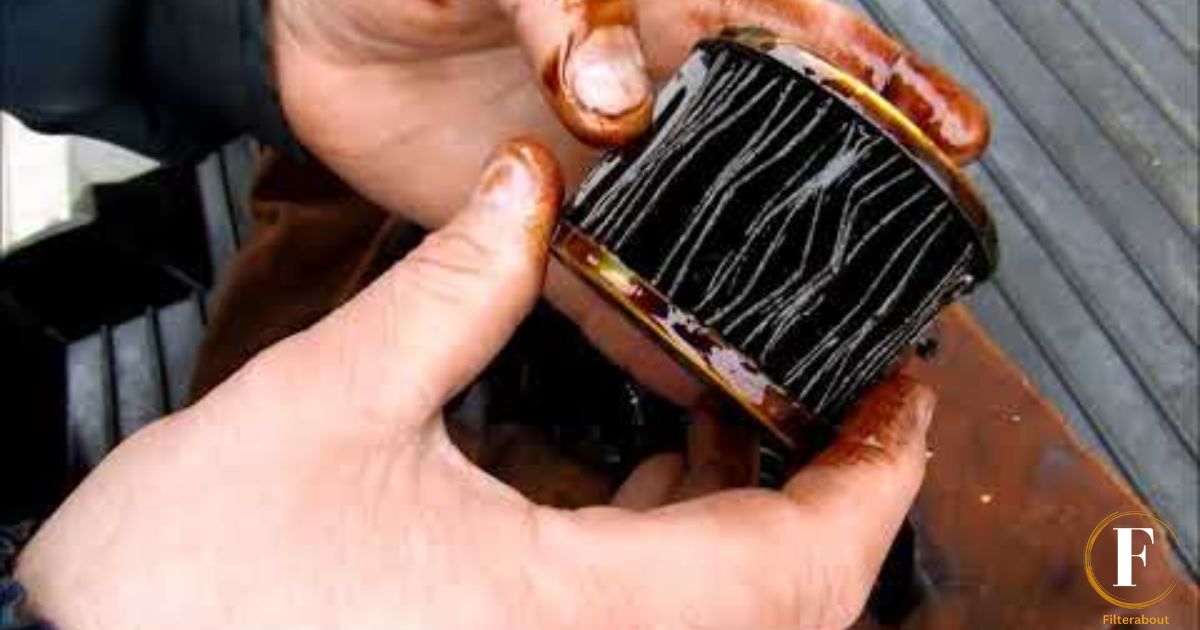


![Jynxzi Age, Net Worth, Career[2024]](https://filterabout.com/wp-content/uploads/2024/05/Who-Is-Shanin-Blake-Age-Wiki-Parents-Dating-Net-Worth-300x148.jpg)
![Jynxzi Age, Net Worth, Career[2024]](https://filterabout.com/wp-content/uploads/2024/05/Jynxzi-Age-Net-Worth-Career2024-300x148.jpg)


![Kutty Surumi Net Worth, Bio, Age[2024]](https://filterabout.com/wp-content/uploads/2024/05/Kutty-Surumi-Net-Worth-Bio-Age2024-300x148.jpg)



![Jynxzi Age, Net Worth, Career[2024]](https://filterabout.com/wp-content/uploads/2024/05/Who-Is-Shanin-Blake-Age-Wiki-Parents-Dating-Net-Worth-150x150.jpg)